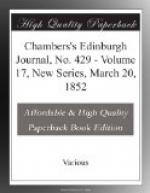LITERARY CIRCLES OF LONDON.
The society of the literary world of London is conducted after this wise:—There are certain persons, for the most part authors, editors, or artists, but with the addition of a few who can only pride themselves upon being the patrons of literature and art—who hold periodical assemblies of the notables. Some appoint a certain evening in every week during the season, a general invitation to which is given to the favoured; others are monthly; and others, again, at no regular intervals. At these gatherings, the amusements are conversation and music only, and the entertainment is unostentatious and inexpensive, consisting of tea and coffee, wine or negus handed about in the course of the evening, and sandwiches, cake, and wine at eleven o’clock. Suppers are prohibited by common consent, for costliness would speedily put an end to society too agreeable to be sacrificed to fashion. The company meets usually between eight and nine, and always parts at midnight.—The Critic.
THE SKY-LARK’S SONG.
It comes down from the clouds
to me,
On this sweet
day of spring;
Methinks it is a melody
That angel-lips
might sing.
Thou soaring minstrel! winged
bard!
Whose path is
the free air,
Whose song makes sunshine
seem more bright,
And this fair
world more fair!
I ask not what the strain
may be,
Thus chanted at
’Heaven’s gate’—
A hymn of praise, a lay of
joy,
Or love-song to
thy mate.
Vain were such idle questioning!
And ’tis
enough for me
To feel thou singest still
the notes
Which God gave
unto thee.
Thence comes the glory of
thy song,
And therefore
doth it fall,
As falls the radiance of a
star,
Gladdening and
blessing all!
Oh! wondrous are the living
lays
That human lips
have breathed,
And deep the music men have
won
From lyres with
laurel wreathed:
But there’s a spell
on lip and lyre,
Sweet though their
tones may be—
Some jarring note, some tuneless
string,
Aye mars the melody.




